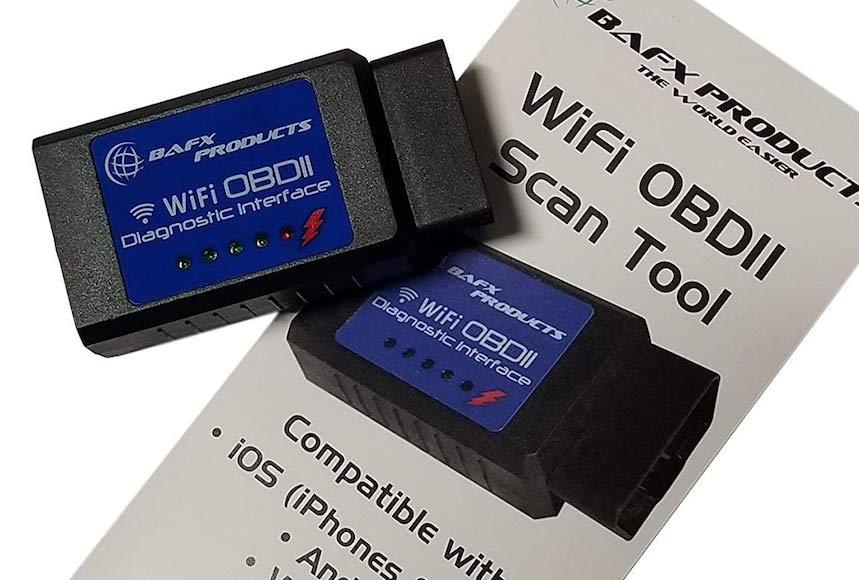Squeaky brakes are one of the most annoying things on a car. It is embarrassing and can be very frustrating especially if you just spent the weekend doing your own brake job. Every brake squeak is different, and it can be hard to say what exactly is causing yours. If you follow these guidelines though I promise you will be well on your way to getting rid of your brake squeak.
The main causes of brake squeak are your brake pads have run out of friction material and either the metal warning tab is contacting the metal surface of your rotors (causing a screeching on braking), or your actual brake pad has worn down to the metal backing plate.
Table of Contents
If you did just do a brake job and you still have brake squealing you need to recheck:
1. Proper installation
2. Proper lubrication on caliper slide pins
3. Your rotors are to spec and you removed any glazing from old rotors before installing new brake pads
4. You can add a product or lubrication to the rear of the brake pads to help prevent noise
5. That you’re using OEM brake pads/rotors– aftermarket pads or rotors can cause noises
6. Clean all surfaces where the brake pad needs to move (caliper hanger)
7. Apply anti-seize to the “ears” of the brake pads to help allow them to move freely over time.
Recently Replaced Brakes or Are You Unsure of Brake Pad Life Left?:
There are basically two scenarios. Either you just recently replaced your brakes either front or back, or both, or you haven’t done your brakes recently they’re just starting to squeak.
Did you just do your car or bike brakes and now they’re squeaking? You’re going to need to take them apart and make sure you got everything right, and relubricate everything.
Are your brakes just squeaking but you haven’t replaced them recently? You’re going to need to inspect your brakes and figure out whether it is your front or rear brakes squeaking. If you don’t have enough pad material left on your brake pads, you will need to replace the pads (which should fix your squeaks). If the pads do have plenty of life left, and the wear bar is not grinding on the rotor, then you’ll also need to take the brakes apart and re-lubricate everything/follow my guide:
 Steps to fixing your squeaking brakes:
Steps to fixing your squeaking brakes:
- If you haven’t done the brakes recently, first check to make sure the front pads and rear shoes have material left.
- The squeal may be due to the metal on metal contact from used up brake pads, then you must replace the pads asap.
- If you used aftermarket pads or rotors and are getting a squeak. You can try the steps below, but really you should be using OEM pads and rotors always! You’re asking for squeak by using cheap parts. Keep that in mind as you follow the steps below.
- Make sure the pads were the correct part, and any shims were installed correctly.
- Double check that you follow the correct “bedding” procedure for the brakes. Contact the manufacturer directly and ask them what their “bedding procedure is.” This can be the difference between awesome brakes, and squeaky brakes that don’t work as well as they should. For an example of a brake bedding procedure read Brembo’s here.
Take everything apart and re-clean / sand any rust on the brake caliper.
- A lot of professional mechanics will actually take off the caliper bracket (usually two 17mm / 19mm bolts on the back) and put it in a sandblaster and remove all the crud.
- You can take it off and use sandpaper to remove any rust, metal corrosion, etc. Focus on the parts where the actual brake pad will be rubbing against / sliding.
- Reinstall and use anti-seize to grease the ears of the brake pad / the parts where the brake pad will be sliding as it moves around.
- A lot of professional mechanics will actually take off the caliper bracket (usually two 17mm / 19mm bolts on the back) and put it in a sandblaster and remove all the crud.
-
Make sure the caliper sliding pins are moving freely:
- Take them off, clean them, and re-grease them with a synthetic rubber friendly grease. The amount of times you will see these sticking, rusty, and gross because of a lack of care on the previous mechanic’s brake job is crazy.
- If these caliper slide pins stick you will see a couple things happen:
the potential for noises increases as the pads do not fully release
- pads will wear at different rates, inner and outer pads will look very different (this is the best clue that a caliper slide pin is sticking, or a caliper is stuck).
- Poor braking as the brakes will be too hot on that side not allowing the brakes to cool properly and work efficiently.
- If these caliper slide pins stick you will see a couple things happen:
- Use a product designed to be applied to the brake of the brake pads to help stop the squeak.
- My favorite product is this one (you can find it in most auto parts stores) or on Amazon here.
- Never use any product that you spray on, or do not need to actually take apart the brake parts to apply. Any product that claims you just spray near the brake pads and it’ll stop the squeaking is dangerous and a joke.
Make sure you know where the brake noise is coming from:
I had one guy who had taken his car to the shop several times complaining of front brake noise.
Why? Because he had had the front brakes replaced recently, and he assumed the noise was coming from a poor installation.
The shops kept redoing the front brake job and the squeak kept persisting. That should have been the first clue that it wasn’t the front brakes, but he kept getting more and more frustrated.
He called me because he wanted to do the brakes together to make sure it was done right.
- I followed all the guidelines I lined out above. We greased everything.
- I applied the CRC disc brake quiet.
- We cleaned everything thoroughly.
- And we installed new pads and new rotors.
- Guess what? The squeak returned immediately when we went for our test drive.
- I immediately laughed and told him to put his head out the window while he listened to the rear of the car.
- Then I pulled the e-brake (which engages the rear brakes).
- The squeak came on loud.
- He looked at me dumbfounded, he had wasted like two weeks trying to stop a front brake squeak.
- When really it was the rear brakes all along!
- The squeak came on loud.
- Don’t be like that. Make sure you know actually where the squeak is coming from. You can do that by testing the e-brake rear brake trick first.
- Before you even start to think about taking things apart, know where the squeak is coming from.
 Pro tips/life hacks/professional advice on stopping brake squeak:
Pro tips/life hacks/professional advice on stopping brake squeak:
- Sand the edges of the pads to remove the rough edges.
- Sand the rotors to give them a rough finish in between brake jobs if you are not replacing rotors, or having them resurfaced. Make sure you use high-quality sandpaper, and clean with brake clean after. The goal is to just remove the shiny sheen on the rotors so the new pads can “bed” properly.
- Use a high-quality brake pad, and if the noise keeps coming back after doing everything above think about changing the pad material. Pads typically come semi-metallic, copper, metallic etc., with tons of different brands. Sometimes one brand or material just doesn’t like the rotors and you need to change one of those variables.
- Use high-quality rotors. Avoid the rotors on eBay that are $20. Use a brand that is highly reviewed and makes a decent product.
- Remove any roughness on the pads “ears” and make sure everything is lubricated properly.
- Bed the brakes properly. That means driving the car hard and braking hard. Do not be shy with this.
- Double and triple check that you follow the correct shimming procedure.
- Make sure the caliper is working properly, and nothing is “sticking”
- Follow the tips in these videos by these youtube stars:
Or my own video on the five products you should have for every high speed brake job:
Professional Level Brake Products You Need:
- CRC Brake Squeal Stop (Disc Brake Quiet) you apply it to the back of the pads and let it set up before installing.
- Brake Cleaner (or read my article on how to make your own brake cleaner and save money here) Bonus– I also show how to make your own penetrating oil as well.
- An impact driver set (the kind you hit with a hammer) or this awesome specialized screwdriver for brake rotor screws. To read my product review of the screwdriver read my article titled “how to remove those pesky rotor set screws the better way” here.
- Rubber safe grease (nonpetroleum based– which is like 90% of grease at the auto parts store)– I recommend this Castrol Red Rubber Grease. Any full synthetic grease will work. You can use this stuff on the caliper slide pins, back of the pads if you don’t have the CRC stuff, and anything that touches rubber or other seals. I recommended it in my article on life hacks for a mechanic here.
If you’re just getting started working on your own cars, please read my article on the best ratchets of 2018 and see why you don’t need to spend an arm and a leg. Read here, and save yourself buying junk tools or buying way too expensive stuff for what you need.
Be safe!

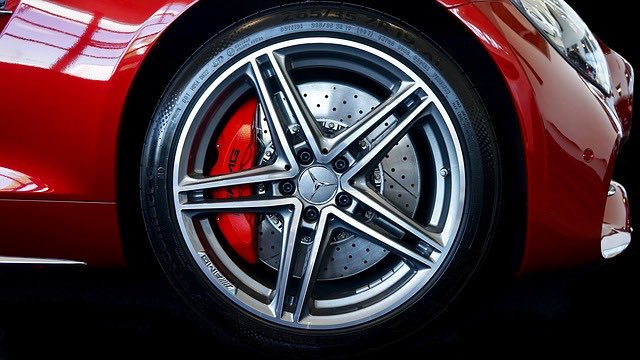
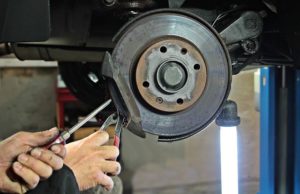 Steps to fixing your squeaking brakes:
Steps to fixing your squeaking brakes: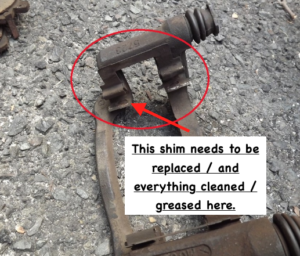 Take everything apart and re-clean / sand any rust on the brake caliper.
Take everything apart and re-clean / sand any rust on the brake caliper.
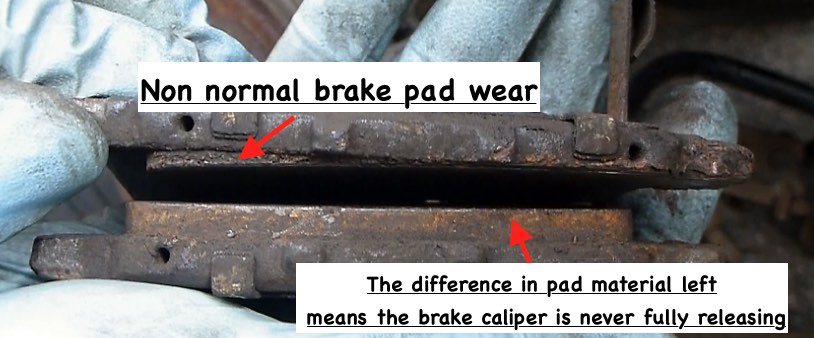 the potential for noises increases as the pads do not fully release
the potential for noises increases as the pads do not fully release Pro tips/life hacks/professional advice on stopping brake squeak:
Pro tips/life hacks/professional advice on stopping brake squeak:



